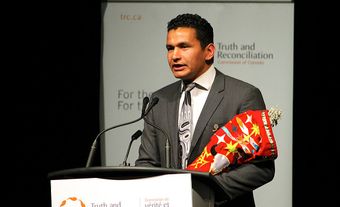Henri Bergeron
Henri Bergeron, media personality, author (b at Saint-Lupicien, Man 1925; d Montreal 10 Jul 2000). The son of a French Canadian farmer and railwayman and a pious and devoted woman from Cevennes, he was born in a very small pioneer house, and grew up in a family of 13 children. During his education at the Collège des Jésuites (Saint-Boniface), and then at the U of Manitoba (Winnipeg), for doctoral studies in law, he discovered a passion for performance and communication. In 1943, he made his stage debut at the Cercle Molière, the oldest theatre company in Canada, where his sister Liliane (1928-) a pioneer for women in radio, and his brother Léandre (1933-), a writer and future doctor of letters, would soon join him. Bergeron, however, would not make a career in this field. The following year he married Yvonne Mercier (1923-), a nurse who bore him five children.
Himself a radio pioneer, Bergeron was successively an announcer on the first French station in the West (CKSB, Saint-Boniface, 1946), a moderator and director of programming for CKCH-Hull (Qc, 1949-1952), and the first French language host on Canadian television (CBFT-Montréal, 1952), particularly distinguished by his perfect bilingualism. Throughout his prolific career, he jointly carried on duties as a gala host, radio announcer, National Film Board narrator (NFB, Montréal) and communications professor at the U de Montréal, and the success of his programs offered no contradictions: L'Heure du Concert, Concert pour la Jeunesse (the 60s), Les Beaux Dimanches (the 70s-80s), to name only the most prominent.
Bergeron was an ardent defender of the quality and purity of the French language, respected by the learned public, and adulated by popular audiences who acknowledged his simplicity and jovial optimism. He ended his career heaped with honours and awards, including le prix du Conseil de la Vie française en Amérique (1963), The Order of Canada (1978), l'Ordre des francophones d'Amérique (1989), l'Ordre de la Pléiade (1994) and l'Ordre national du Québec (1995).
In later years, Henri Bergeron traded in his microphone for a pen, but through his numerous works we see the qualities that made him a famous radio personality: the rhythm of a story teller, the sense of suspense, and clarity and concision of language. If his memoires, Un bavard se tait pour écrire (1989) and Le cœur de l'arbre: Le bavard récidive (1995) take us from the foot of the Pembina Mountain (Man) to the summit of the Radio-Canada tower in Montréal, La communication... c'est tout (1992) teaches us the art of speaking well, while L'Amazone (1998), a romantic biography written in homage to his wife and the pioneers of the West, lets us share the amazing journey on horseback of a 19th century nurse who accompanied a group of colonists from Québec to Manitoba.

 Share on Facebook
Share on Facebook Share on X
Share on X Share by Email
Share by Email Share on Google Classroom
Share on Google Classroom


